Choosing & Installing an
Outdoor Security Light

In today's world, home security is not merely an option—it's essential. Outdoor security lighting, often the first line of defence against potential intruders, serves a dual purpose. Firstly, it illuminates our homes' exterior, ensuring that dark corners and potential hiding spots are well-lit, reducing the chances of unwelcome surprises. Secondly, these lights add an aesthetic touch, accentuating architectural features, gardens, and pathways, thus merging functionality with style.
But with a plethora of choices in the market, how do you make an informed decision? From the eco-friendly solar lights that harness the sun's power to the robust and ever-reliable wired versions, the options can seem endless. And as technology continues to evolve, the features of these lights have also expanded, with advancements like motion sensors, smart integrations, and energy efficiency leading the way.
In this guide, we delve deep into the world of
outdoor security lights, offering insights, answering common questions, and guiding you through the selection and installation process. Whether you're a homeowner looking to upgrade your current setup or someone purchasing their first outdoor security light, this article aims to shed light on your path.

Why Invest in an Outdoor Security Light?
Outdoor security lights are more than just practical tools; they are strategic investments into the safety and appearance of your property. Here's why considering such an addition is crucial:
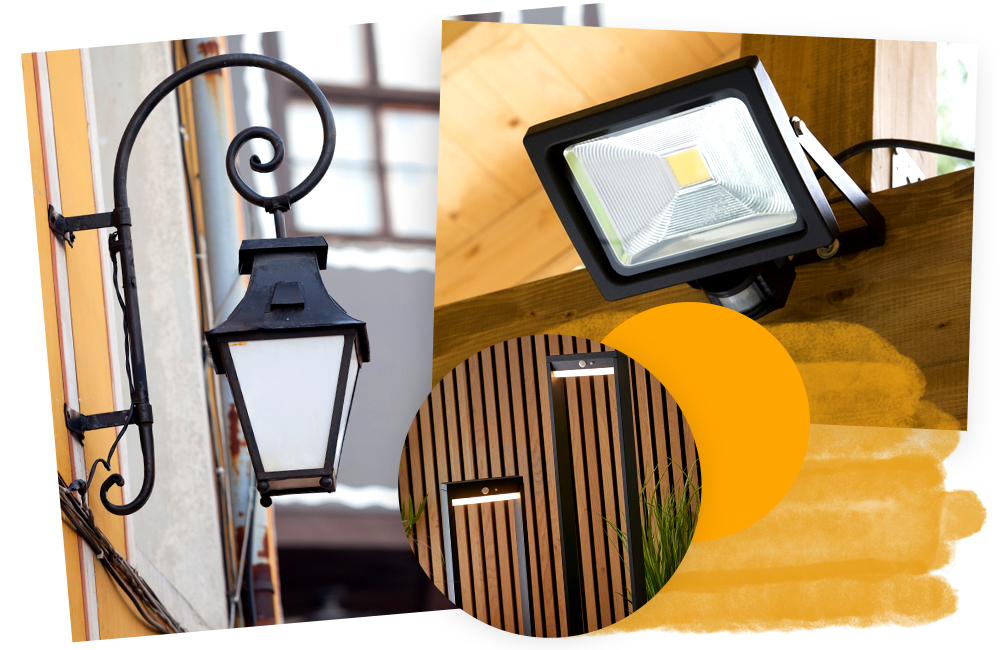
Deterrence Against Potential Threats
One of the primary purposes of security lights is to ward off potential intruders. A well-lit property can be a significant deterrent for would-be burglars. Research suggests that criminals are less likely to target homes with clear and bright exteriors, simply because it increases the risk of being spotted. By eliminating dark corners and shadows, you're essentially reducing hiding spots and making your property less appealing to intruders.
Enhanced Safety and Visibility
Slippery pathways, unexpected steps, or unfamiliar terrain can pose risks, especially in low light. A strategically placed security light can ensure that driveways, walkways, and entry points are well-illuminated, reducing the chances of accidents. Whether you're returning home late or have guests over, a clear path is always appreciated.
Property Value and Aesthetics
Beyond the practical aspects, security lights can be aesthetic additions. Modern designs not only offer functionality but also complement the architectural features of your home. Plus, a well-lit exterior can boost your property's value, signaling to potential buyers that the home is safe, well-maintained, and thoughtfully designed.

Types of Outdoor Security Lights & Common Questions
The market is flooded with various kinds of outdoor security lights, each with its unique advantages and potential drawbacks. As you navigate through the options, understanding the distinctions can help you tailor your choices to your specific needs. Let's break down the two major types: solar and wired.
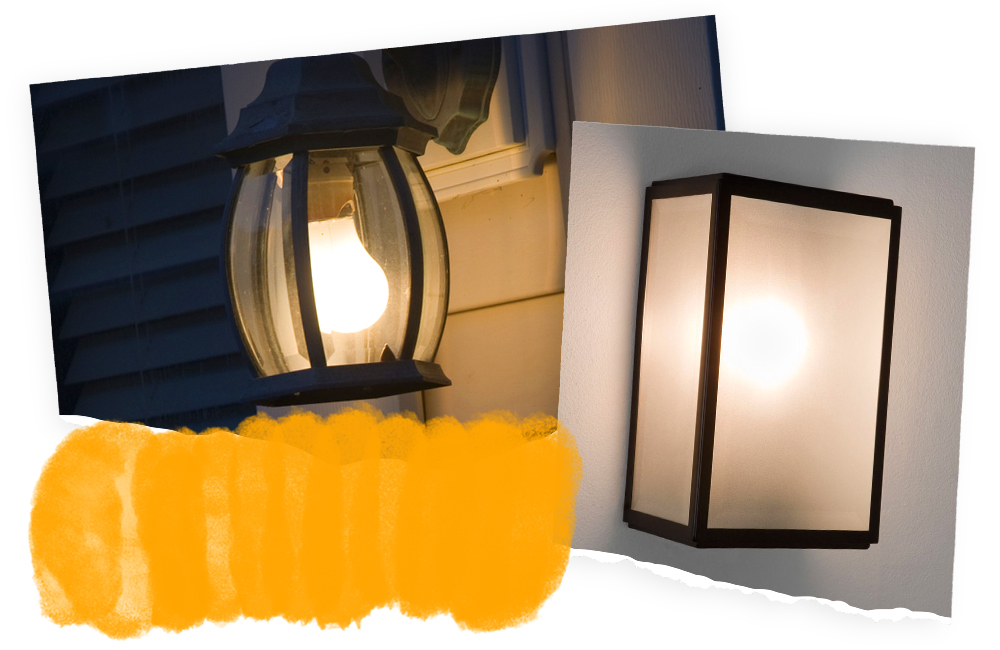
Solar Security Lights
What are they? These are lights powered by the sun. Fitted with solar panels, they capture sunlight and convert it into electricity, storing it in batteries for use during the night.
Pros
Cons
-
Eco-friendly: They reduce carbon footprint, relying on a renewable energy source.
-
Cost-effective in the long run: After the initial investment, these lights run without adding to your electricity bill.
-
Ease of installation: Without the need for complex wiring, they can be installed almost anywhere with good sunlight.
-
Dependence on sunlight: Their efficiency is contingent upon receiving adequate sunlight. Thus, performance can wane during prolonged cloudy days or if placed in shaded areas.
-
Limited operational time: Depending on the battery's capacity, they might not last the entire night.
Key Questions:
Q: Do they work in winter?
A: Solar lights do function in winter, but with decreased efficiency due to fewer daylight hours and potentially weaker sunlight.
Q: Are solar-powered security lights any good?
A: For many homeowners, they are excellent, especially for regions with abundant sunshine. They are also ideal for places where wiring might be challenging.
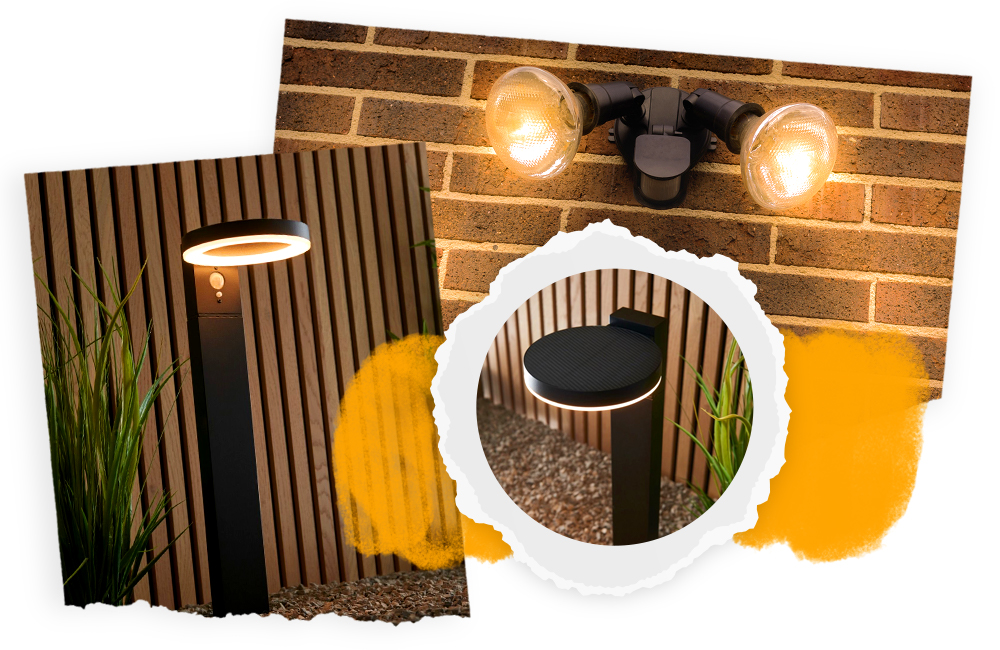
Wired Security Lights
What are they? As the name suggests, these lights are connected to the home's electrical system through wires. They rely on the grid for their power source.
Pros
Cons
-
Consistency: Deliver consistent brightness and can function throughout the night.
-
Powerful: Generally, they can offer brighter illumination compared to solar options.
-
Integration with other systems: Can be connected to home automation or security systems for enhanced functionality.
-
Complex installation: Typically requires professional installation, especially for those unfamiliar with electrical systems.
-
Operational cost: Unlike solar lights, they will contribute to your electricity bill.
Cost and Consumption Queries:
Q: How much electricity does a security light use?
A: It varies based on wattage. LEDs, for instance, are more energy-efficient than incandescent bulbs. Modern security lights, especially LED versions, are designed for energy efficiency, meaning they consume significantly less power than older models.
Q: How much does a security light cost to run?
A: This depends on your local electricity rates and the light's wattage. However, LED security lights are typically inexpensive to operate. Typically, the cost of running a 3W LED bulb per year is between £3 and £5, based on 10 hours a day.

Understanding Lumens & Brightness
Choosing the right outdoor security light often boils down to understanding its brightness — but how do we objectively measure it? Enter lumens, a unit that provides clarity on this matter.

Different outdoor lighting solutions demand different IP ratings based on their location and exposure to environmental elements.
What are Lumens?
Lumens are the metric used to measure the total amount of visible light emitted by a source. In simpler terms, it quantifies the brightness of a light bulb or fixture. Higher lumen values indicate a brighter light, while lower values signify dimmer ones. When purchasing security lights, this number helps in determining how effectively an area will be illuminated.
How Many Lumens Do I Need?
General Outdoor Security: For basic illumination around exterior spaces like walkways, driveways, or gardens, a light fixture providing between 700-1300 lumens typically suffices. This range ensures the area is well-lit without being overwhelmingly bright.
High-security Areas: For spaces that require enhanced security, like entrances or areas with valuable items (e.g., a garage housing expensive equipment), a brighter light in the range of 1500-2000 lumens might be more appropriate. This ensures potential intruders have fewer shadows or dark spots to hide.
Decorative or Accent Lighting: If you're looking to highlight specific landscaping features or create a cozy ambiance, a softer light ranging from 50-300 lumens can be ideal.
Lumens vs. Watts: Traditionally, people used watts to determine the brightness of a bulb. However, watts measure energy consumption, not brightness. With the advent of energy-efficient LED lights, relying on wattage can be misleading. A 10-watt LED bulb can produce the same brightness as a 60-watt incandescent bulb, further emphasizing the importance of checking lumens instead.
Lux: A Related Metric: While lumens measure the total light output, lux measures how much of that light hits or illuminates a given surface. One lux is equal to one lumen per square meter. For outdoor security lights, a higher lux indicates a more focused or directed light, which can be crucial for spotlighting or accentuating specific areas.

Features of Security Lights
Modern security lights come packed with features that not only enhance their primary function of providing security but also make them more user-friendly and efficient.
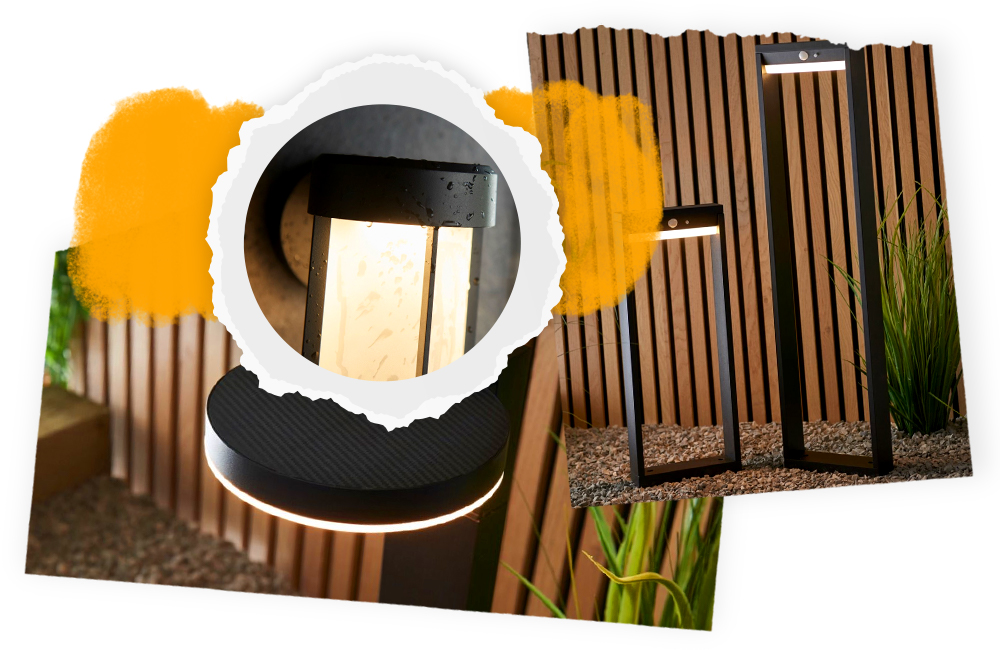
Motion Sensors (PIR)
Passive Infrared (PIR) sensors detect infrared radiation, essentially picking up on heat signatures, like those of humans or animals. When motion is detected, the light activates. This feature saves energy and adds an element of surprise for potential intruders.
How to adjust a PIR security light?
Most PIR lights come with sensitivity and duration controls. Sensitivity adjusts how easily the light is triggered, while duration controls how long it remains on once activated.
Adjustable Heads
For those needing focused lighting, adjustable heads are a boon. They allow you to direct the light exactly where you need it, be it a doorway, driveway, or a specific part of the garden.
Smart Integration
Some security lights can be integrated with home automation systems, allowing remote control, scheduling, or synchronisation with other security measures.
Dusk-to-Dawn Sensors
These sensors automatically turn on the light at dusk and off at dawn, ensuring your property remains lit during nighttime without manual intervention.

Bulb Replacement
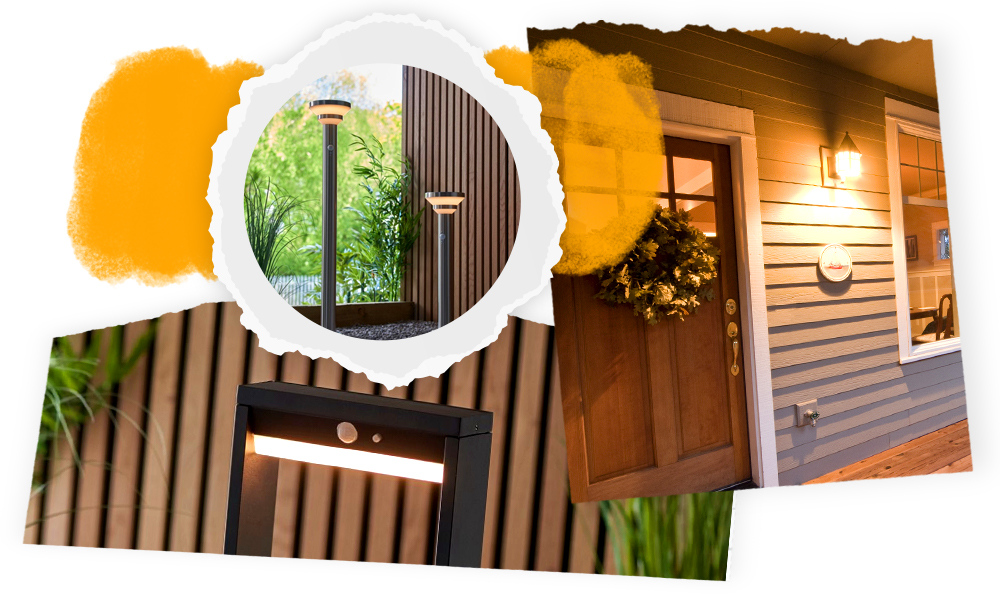
How long do LED security lights last?
On average, LED bulbs last about 25,000 to 50,000 hours, depending on usage and quality. When the light starts to dim or flicker, it may be time for a replacement.
Can you replace LED bulbs in security lights?
Most modern security lights allow for bulb replacements, though some models might have integrated LED units that require the entire fixture to be replaced.
Wiring & Electricals
If you've opted for a wired security light, periodically check for frayed wires or signs of wear in the connections. This not only ensures optimal functioning but also prevents potential safety hazards.

Installation & Wiring
The process of setting up an outdoor security light may seem daunting, especially when wiring is involved. However, with the right guidance and precautions, this task can be accomplished safely and effectively.
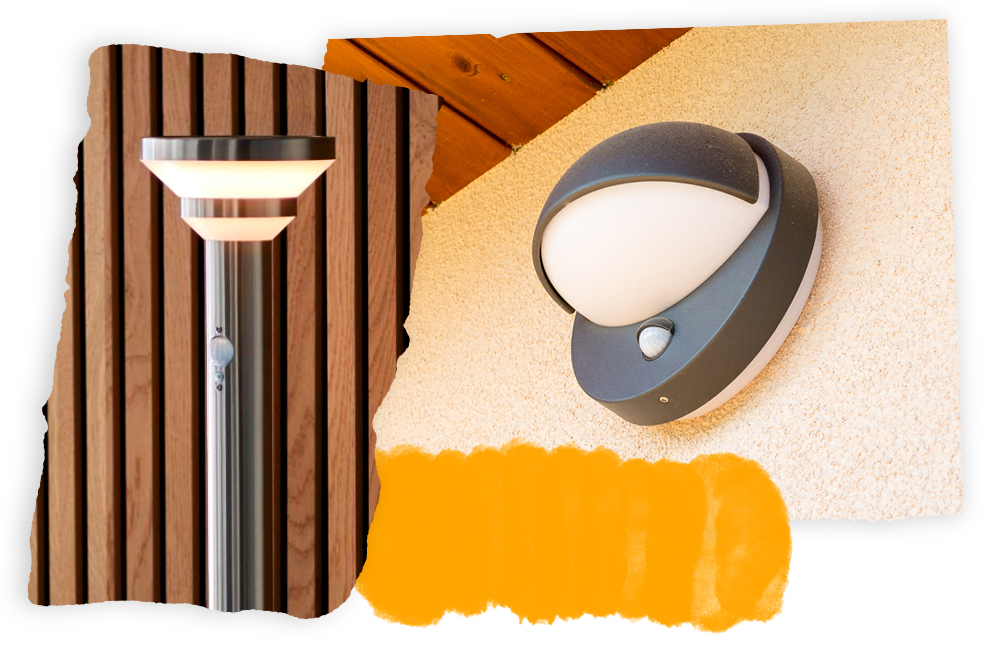
Placement is Key
Before delving into installation, it's crucial to decide on the light's location. Consider high-traffic areas, potential intruder entry points, or regions that are typically shadowed or dark. The height of installation also matters; placing it too low might make it easy to tamper with, but too high might reduce its effectiveness. A height of 8 to 10 feet is generally recommended.
Solar vs. Wired
Solar Lights: The main advantage of solar lights is the ease of installation. There are no wires to manage, making the process straightforward. Ensure that the light's solar panel receives adequate sunlight throughout the day. Avoid shaded areas or those that might get covered over time due to growing trees or foliage.
Wired Lights: These require a bit more attention during installation due to the involvement of electrical systems.
How to wire a security light?
1. Turn off the electricity at the main breaker to ensure safety.
2. Run an outdoor cable from the light's location to an outdoor switch box.
3. Connect the live, neutral, and earth wires appropriately, using wire connectors. Ensure all connections are tight.
4. Affix the security light in the desired location and route the wiring neatly, using cable clips to secure.
5. Once connected, restore power and test the light.
Can I wire a security light to a plug? While this can be done, it's essential to use a weatherproof outdoor plug and ensure that the entire setup is protected from the elements. Consult a professional if unsure.
Professional Installation
If you're not comfortable handling electrical tasks or want to ensure the job is done to the highest standard, it's wise to hire a professional. They can advise on placement, handle the wiring, and test the system for optimal performance.
Safety Precautions
1. Always turn off the power when working with electrical systems.
2. Use insulated tools and wear rubber-soled shoes.
3. Ensure outdoor electrical connections are waterproofed or adequately shielded from rain and moisture.
4. If ever in doubt, consult with a qualified electrician or installation expert.

Browse Our Outdoor Security Lights
Choosing the perfect outdoor security light is as much about the product as it is about the trusted source you buy it from. At Lights4Living.com, we bring over 35 years of experience, offering premium home lighting solutions at competitive prices. Our deep-rooted relationships with suppliers allow us to stand confidently behind every product, underscored by our 12-month 'No Quibble' guarantee.
What truly defines our brand is the personal touch we bring to customer service, ensuring you feel valued every step of the way.
Illuminate your outdoor space with the best.
